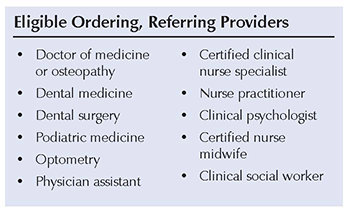Clinical laboratories, pathologists, and a host of other Medicare providers will be affected when as of May 1 the Centers for Medicare and Medicaid Services (CMS) fully implements its edits of claims for ordering and referring providers.Medicare will deny claims that require an ordering or referring provider to be identified and the provider is not identified, is not currently enrolled in Medicare or has a valid opt-out record (the National Provider Identifier and the provider’s legal name must match), and is not of a specialty type that may order or refer the service or item being billed.
The Phase 2 denial edits apply to Part B providers, durable medical equipment suppliers, and Part A home health agencies eligible to bill for services to program beneficiaries. They are intended to weed out fraudulent entities from legitimate health care providers and suppliers, CMS said.
Under the “match or scratch” edits, clinical labs and pathologists are at financial risk if they bill for tests ordered or referred by providers not in the national PECOS file.
During Phase 1, which began in 2009 and ends May 1, contractors continued to process claims for payment but with a warning on the remittance advice that claims may not be paid in the future if the ordering or referring provider is not enrolled in Medicare or is not of a specialty eligible to order or refer.
In Phase 2, claims will not be paid if the ordering or referring provider is not on the national Provider Enrollment, Chain, and Ownership System (PECOS) file and not on the contractor’s master provider file, or if the ordering or referring provider is on the contractor’s master provider file but is not of a specialty eligible to order or refer.
The health care reform law, enacted in 2010, specifies that the PECOS requirement applies to claims for durable medical equipment, prosthetics, orthotics, and supplies and for home health. In an interim rule, CMS added claims for laboratory testing, specialist services, and imaging to the list, using its discretionary authority under the law.
Provider Action Needed
If you order or refer items or services for Medicare beneficiaries and do not have a Medicare enrollment record, you need to submit an enrollment application to Medicare using the Internet-based PECOS or by completing the paper enrollment application (CMS-8550). All enrollment applications, including those submitted over the Internet, require verification of the information reported. Sometimes, Medicare enrollment contractors may request additional information to process the application.
Labs and others that bill for orders or referrals from providers can check the provider’s Medicare enrollment status and specialty against the “Ordering Referring Report” at
http://www.cms.gov/Medicare/Provider-Enrollment-and-Certification/MedicareProviderSupEnroll/index.html; click on “Ordering & Referring Information.”
When billing for items or services from ordering and referring providers, be aware that claims denied because they failed the edits do not expose the Medicare beneficiary to any financial liability.
If you believe a claim was denied inappropriately because it did not initially pass the edits, you may file an appeal through the standard claims appeals process.
